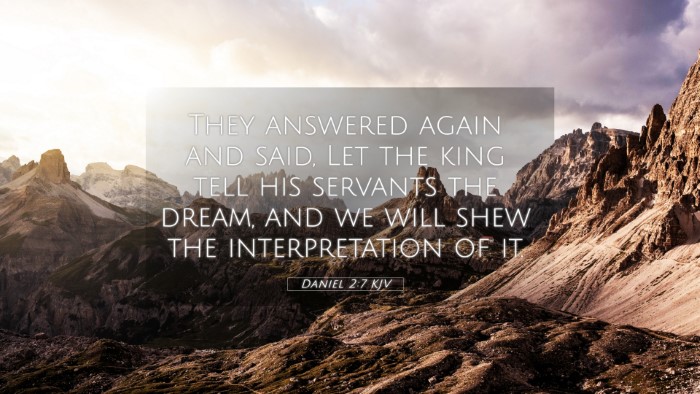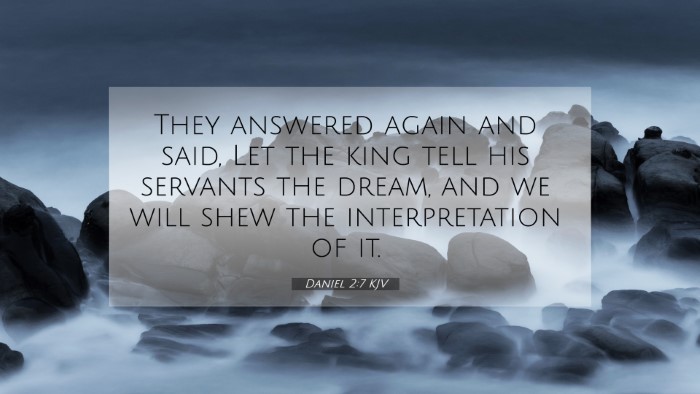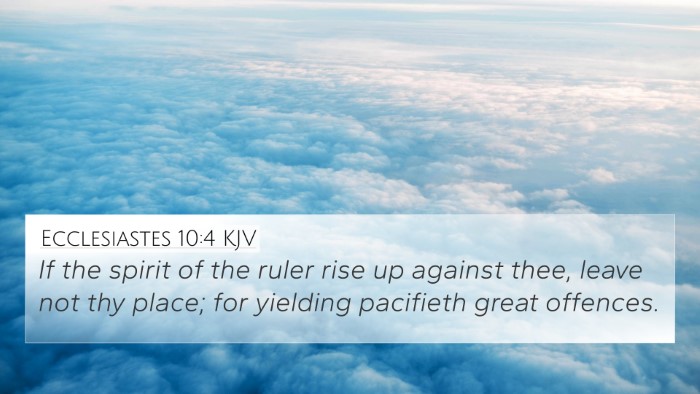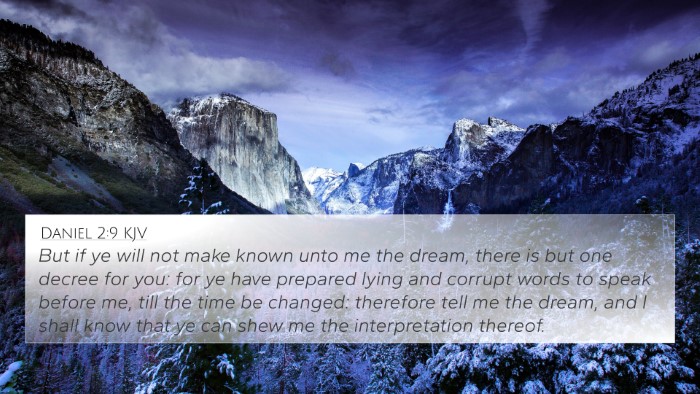Meaning and Interpretation of Daniel 2:7
Daniel 2:7 reads: "They answered again and said, Let the king tell his servants the dream, and we will show the interpretation of it." This verse provides a crucial moment of dialogue between King Nebuchadnezzar and his wise men, marking the beginning of a significant confrontation between divine revelation and human wisdom.
Contextual Overview
This chapter presents the account of King Nebuchadnezzar’s troubling dream and the challenge he poses to his wise men. The king demands that they recount his dream before providing the interpretation, placing them in a position of great peril. They respond in verse 7 with a plea for the king to reveal the dream first, which reflects both their skepticism and desperation.
Insights from Commentaries
-
Matthew Henry's Commentary:
Henry observes that this request indicates the futility of relying solely on human wisdom. The wise men's insistence that the king first reveal the dream exemplifies their acknowledgment of the supernatural demands being placed upon them. This emphasizes the theme of divine sovereignty, illustrating that only God possesses the knowledge necessary to discern the mysteries of the heart and mind.
-
Albert Barnes' Notes:
Barnes notes the significance of the dream’s interpretation as crucial to the survival of the wise men. Their plea marks the turning point where human wisdom fails, pressing the narrative towards God’s revelation through Daniel. It underscores the inadequacy of the magicians and enchanters, who cannot meet the king’s demands without prior knowledge of the dream.
-
Adam Clarke's Commentary:
Clarke points out that this verse reflects a deep sense of urgency from the wise men, filled with fear and awareness of the consequences of failing the king. Their demand for the king to articulate his dream before they provide its meaning suggests a crisis of confidence among those regarded as the wisest in the kingdom. It highlights the limitations of their expertise in the face of the unknown.
Thematic Connections
Daniel 2:7 highlights several key themes within Scripture, such as:
- Divine Control over Human Affairs: This verse leads into themes of divine sovereignty as revealed in subsequent verses.
- Limits of Human Wisdom: The incapacity of the wise men foreshadows a greater dependence on God’s revelation.
- Faith and Trust: It sets the stage for Daniel’s later reliance on prayer and divine insight.
Bible Verse Cross-References
Understanding Daniel 2:7 can be enhanced by examining related scriptures that echo its themes. Below are some significant cross-references:
- Isaiah 47:12-13: Highlights the failure of human wisdom.
- 1 Corinthians 1:25: God's foolishness is wiser than men.
- James 1:5: Calls for asking God for wisdom generously.
- Job 28:12-13: Discusses the search for wisdom and its elusive nature.
- Proverbs 3:5-6: Trusting in the Lord rather than one's own understanding.
- Matthew 10:20: Assurance of God providing wisdom when needed.
- Acts 2:17-18: Promises revelation of dreams and visions.
- Exodus 7:10-12: Similar dynamics of competition between God’s wisdom and human powers.
- Romans 11:33: The depth of God’s wisdom and knowledge.
- Isaiah 40:13-14: Details God’s unparalleled understanding in contrast to human wisdom.
Conclusion
In conclusion, Daniel 2:7 serves as a pivotal verse encapsulating themes of divine wisdom, human limitation, and the quest for understanding hidden truths. The interplay of human desperation and divine sovereignty paves the way for God’s impending revelation through Daniel, marking a critical juncture in the narrative. The connections offered here, as well as the surrounding commentary insights, provide a comprehensive framework for understanding the depth and implications of this verse in the broader biblical context.





